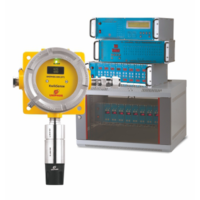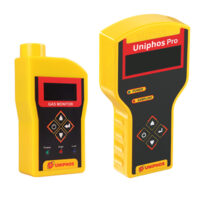Gas Detectors
In any environment where toxic or flammable gases are used, generated, or stored, there is always a threat of employees getting exposed, a danger of explosions, or the risk of suffocation due to low oxygen levels. In such circumstances, gas detection and monitoring are very critical to ensure a safe working environment for your employees
Uniphos gas detectors can be broadly classified into three groups:
Gas Detector Tubes: These chemical detectors consist of sealed glass tubes filled with a sensing chemical that changes color when exposed to the target gas and are primarily used to carry out spot measurements of gas concentrations.
Portable Gas Detectors: These electronic instruments are specifically designed to monitor the work environment or confined spaces for dangerous levels of flammable and toxic gases.
Fixed Gas Detectors: These are designed to continuously monitor and provide alerts for potentially hazardous levels of gas concentrations in the environment.
Uniphos offers a wide range of gas detection and monitoring equipment providing our customers a plethora of options to choose from.
FAQ's
What is a gas detection system
A gas detection system is a device used to detect the presence of different types of gases in an environment. It serves as an early warning system, alerting individuals to potential risks from harmful gases. The system is typically composed of sensors that are sensitive to certain gases, and alarms that activate when the sensors detect gas at dangerous levels.
What is the working principle of gas detection system?
The working principle of a gas detection system is straightforward yet highly effective. It involves a sensor that responds to specific gas or gases. When gas molecules interact with the sensor, a change occurs, often in electrical resistance, triggering an alarm. This change depends on the concentration of gas, allowing the system to determine not just the presence of gas, but also its level.
What types of gases can a gas detection equipment detect?
A gas detection equipment is designed to identify and monitor the presence of various gases in the environment. The types of gases that a gas detection equipment can detect depend on the sensors it is equipped with. Some common gases that these systems can detect include combustible gases, such as methane, propane, and butane, which pose fire and explosion risks.
Apart from these, toxic gases such as carbon monoxide (CO), hydrogen sulfide (H2S), ammonia (NH3), and chlorine (Cl2) can also be detected by these systems.
Which industries use gas leak detectors?
A gas leak detector is widely employed in a range of industries to prioritize safety and mitigate potential risks. The oil and gas industry heavily relies on these systems to monitor for gas leaks, as they are essential in preventing hazardous incidents such as explosions and ensuring the well-being of personnel.
In the chemical industry, gas leak detectors play a critical role in detecting toxic gas releases promptly, safeguarding both workers and the environment. Similarly, the manufacturing sector benefits significantly from these detectors, using them to identify gas leaks from machinery and industrial processes, thus preventing accidents and ensuring a secure workplace.
Even in the hospitality industry, gas leak detectors are crucial for ensuring the safety of occupants by monitoring gas-powered appliances like water heaters and stoves. Lastly, the pharmaceutical industry relies on gas leak detectors to maintain a controlled environment for sensitive processes.
What are the two types of gas detectors?
The two primary types of gas detectors are portable devices and fixed gas detectors. Portable gas detectors are compact and designed to be easily carried around by individuals. They are ideal for personal safety and monitoring gas levels in confined spaces or areas that may not have fixed gas detection systems.
On the other hand, fixed gas detectors are permanently installed in specific locations to provide continuous monitoring of gas levels. They are commonly used in industrial settings, laboratories, and other places where gas leaks or accumulations can pose significant risks.
What are the benefits of using a gas detection system?
A gas detection system offers numerous benefits in various settings. Firstly, these sensor-enabled solutions ensure the safety of both individuals and property by promptly detecting the presence of hazardous gases within and outside premises. By continuously monitoring the environment, these systems provide early warnings, preventing potential accidents and minimizing the risk of fire breakouts.
Another advantage is enhanced productivity. With the assurance of a safe working environment, employees can focus on their tasks without worry, leading to increased efficiency and better performance.






